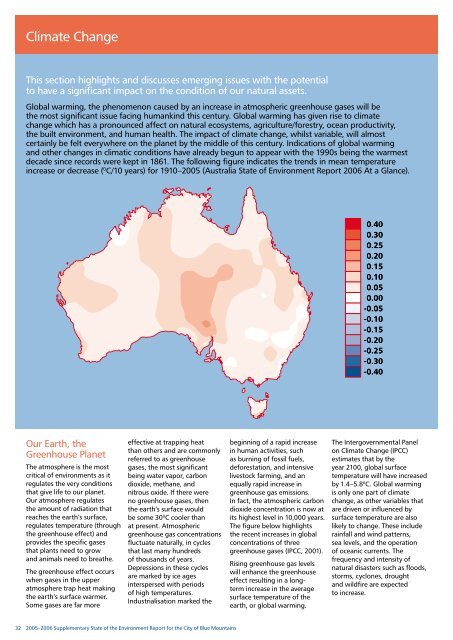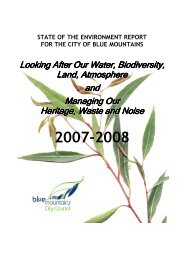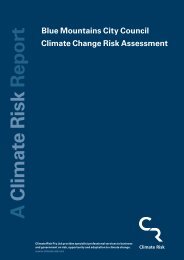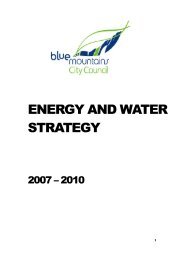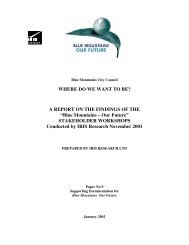State of the Environment Report for the City of Blue Mountains
State of the Environment Report for the City of Blue Mountains
State of the Environment Report for the City of Blue Mountains
Create successful ePaper yourself
Turn your PDF publications into a flip-book with our unique Google optimized e-Paper software.
Climate Change<br />
This section highlights and discusses emerging issues with <strong>the</strong> potential<br />
to have a significant impact on <strong>the</strong> condition <strong>of</strong> our natural assets.<br />
Global warming, <strong>the</strong> phenomenon caused by an increase in atmospheric greenhouse gases will be<br />
<strong>the</strong> most significant issue facing humankind this century. Global warming has given rise to climate<br />
change which has a pronounced affect on natural ecosystems, agriculture/<strong>for</strong>estry, ocean productivity,<br />
<strong>the</strong> built environment, and human health. The impact <strong>of</strong> climate change, whilst variable, will almost<br />
certainly be felt everywhere on <strong>the</strong> planet by <strong>the</strong> middle <strong>of</strong> this century. Indications <strong>of</strong> global warming<br />
and o<strong>the</strong>r changes in climatic conditions have already begun to appear with <strong>the</strong> 1990s being <strong>the</strong> warmest<br />
decade since records were kept in 1861. The following figure indicates <strong>the</strong> trends in mean temperature<br />
increase or decrease ( 0 C/10 years) <strong>for</strong> 1910–2005 (Australia <strong>State</strong> <strong>of</strong> <strong>Environment</strong> <strong>Report</strong> 2006 At a Glance).<br />
0.40<br />
0.30<br />
0.25<br />
0.20<br />
0.15<br />
0.10<br />
0.05<br />
0.00<br />
-0.05<br />
-0.10<br />
-0.15<br />
-0.20<br />
-0.25<br />
-0.30<br />
-0.40<br />
Our Earth, <strong>the</strong><br />
Greenhouse Planet<br />
The atmosphere is <strong>the</strong> most<br />
critical <strong>of</strong> environments as it<br />
regulates <strong>the</strong> very conditions<br />
that give life to our planet.<br />
Our atmosphere regulates<br />
<strong>the</strong> amount <strong>of</strong> radiation that<br />
reaches <strong>the</strong> earth’s surface,<br />
regulates temperature (through<br />
<strong>the</strong> greenhouse effect) and<br />
provides <strong>the</strong> specific gases<br />
that plants need to grow<br />
and animals need to brea<strong>the</strong>.<br />
The greenhouse effect occurs<br />
when gases in <strong>the</strong> upper<br />
atmosphere trap heat making<br />
<strong>the</strong> earth’s surface warmer.<br />
Some gases are far more<br />
effective at trapping heat<br />
than o<strong>the</strong>rs and are commonly<br />
referred to as greenhouse<br />
gases, <strong>the</strong> most significant<br />
being water vapor, carbon<br />
dioxide, methane, and<br />
nitrous oxide. If <strong>the</strong>re were<br />
no greenhouse gases, <strong>the</strong>n<br />
<strong>the</strong> earth’s surface would<br />
be some 30 0 C cooler than<br />
at present. Atmospheric<br />
greenhouse gas concentrations<br />
fluctuate naturally, in cycles<br />
that last many hundreds<br />
<strong>of</strong> thousands <strong>of</strong> years.<br />
Depressions in <strong>the</strong>se cycles<br />
are marked by ice ages<br />
interspersed with periods<br />
<strong>of</strong> high temperatures.<br />
Industrialisation marked <strong>the</strong><br />
beginning <strong>of</strong> a rapid increase<br />
in human activities, such<br />
as burning <strong>of</strong> fossil fuels,<br />
de<strong>for</strong>estation, and intensive<br />
livestock farming, and an<br />
equally rapid increase in<br />
greenhouse gas emissions.<br />
In fact, <strong>the</strong> atmospheric carbon<br />
dioxide concentration is now at<br />
its highest level in 10,000 years.<br />
The figure below highlights<br />
<strong>the</strong> recent increases in global<br />
concentrations <strong>of</strong> three<br />
greenhouse gases (IPCC, 2001).<br />
Rising greenhouse gas levels<br />
will enhance <strong>the</strong> greenhouse<br />
effect resulting in a longterm<br />
increase in <strong>the</strong> average<br />
surface temperature <strong>of</strong> <strong>the</strong><br />
earth, or global warming.<br />
The Intergovernmental Panel<br />
on Climate Change (IPCC)<br />
estimates that by <strong>the</strong><br />
year 2100, global surface<br />
temperature will have increased<br />
by 1.4–5.8 0 C. Global warming<br />
is only one part <strong>of</strong> climate<br />
change, as o<strong>the</strong>r variables that<br />
are driven or influenced by<br />
surface temperature are also<br />
likely to change. These include<br />
rainfall and wind patterns,<br />
sea levels, and <strong>the</strong> operation<br />
<strong>of</strong> oceanic currents. The<br />
frequency and intensity <strong>of</strong><br />
natural disasters such as floods,<br />
storms, cyclones, drought<br />
and wildfire are expected<br />
to increase.<br />
32<br />
2005–2006 Supplementary <strong>State</strong> <strong>of</strong> <strong>the</strong> <strong>Environment</strong> <strong>Report</strong> <strong>for</strong> <strong>the</strong> <strong>City</strong> <strong>of</strong> <strong>Blue</strong> <strong>Mountains</strong>


